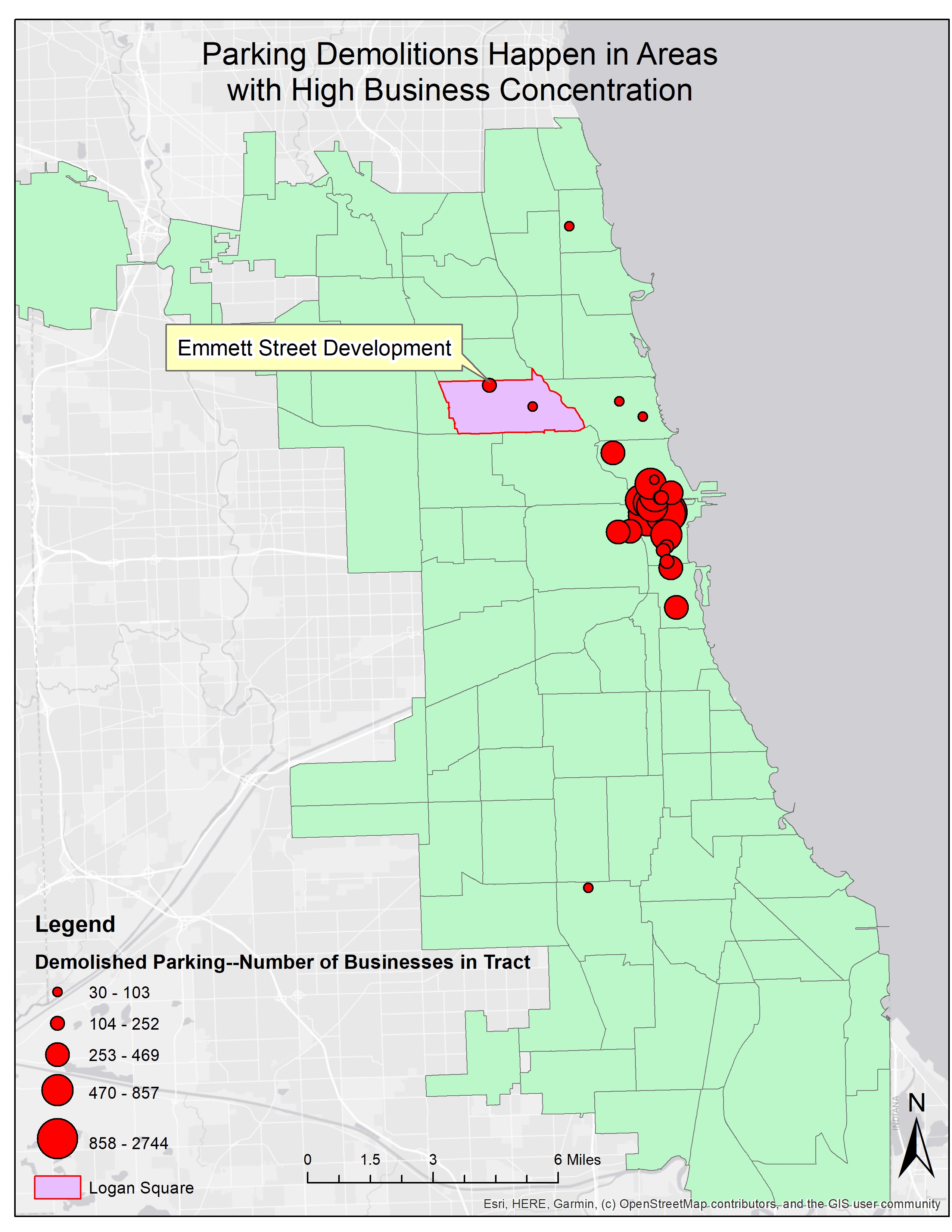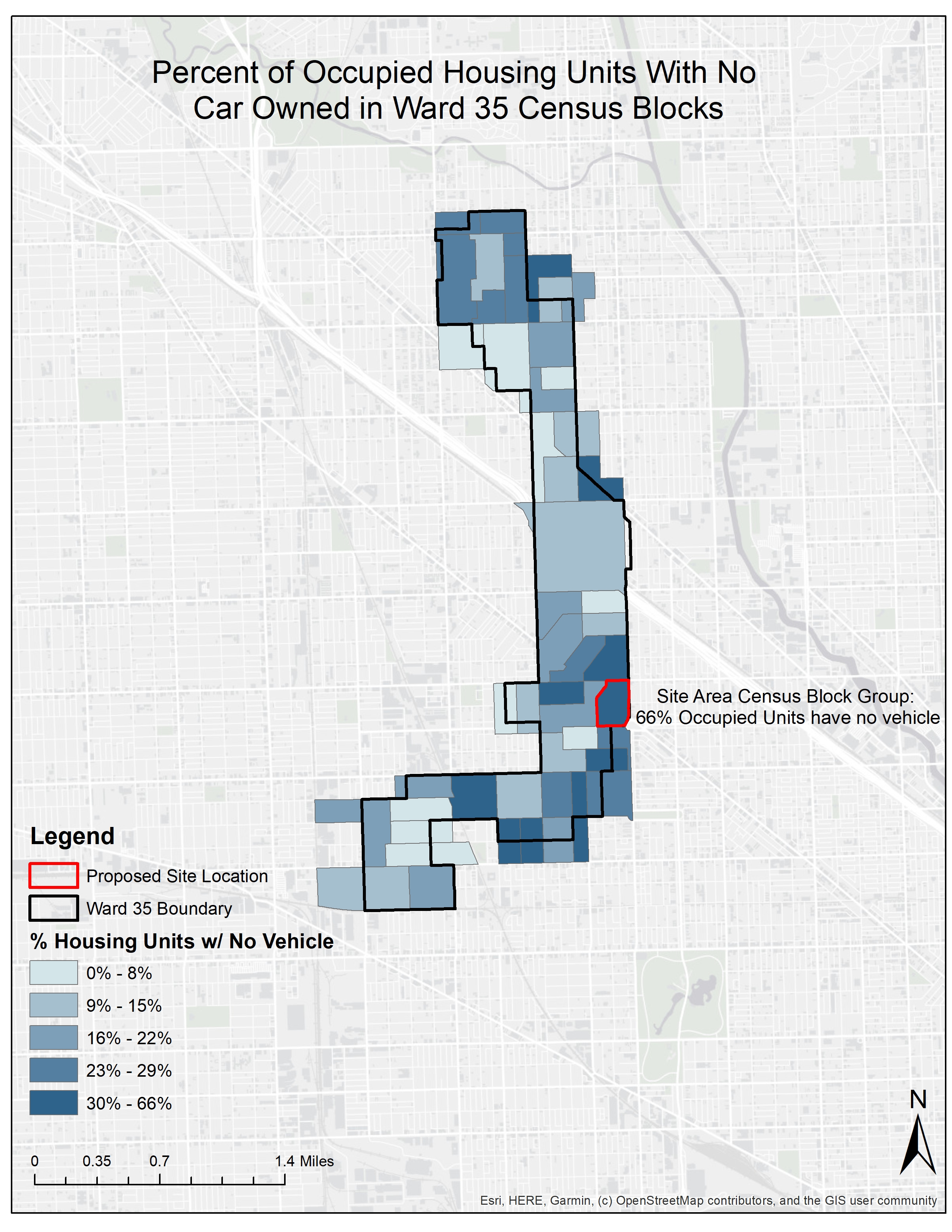What a rececent Logan Square lawsuit teaches us about an age-old tactic

Image courtesy Google Street View
The Emmett St. site of a proposed Logan Square affordable housing development
This original research appeared in a Block Club article on April 22nd, 2020.
Last month, a developer filed a lawsuit against the City of Chicago in an attempt to block a planned affordable housing development on Emmett St. adjacent to the Logan Square Blue Line stop. Although the development has received broad public support from residents and 35th Ward alderman Carlos Ramirez-Rosa, a small group of opponents continues to raise opposition with an expanding set of grievances. The latest is a lawsuit that seeks to block the development, claiming that the removal of a surface parking lot would cause “irreparable injury” to local businesses due to an assumed lack of parking and increased traffic.
There are numerous recent examples in Chicago where parking lots were demolished for other uses—and they tend to happen in areas with high business density and transit access.
In order to consider this claim, MPC analyzed five years of Chicago parking demolition data to determine how the Logan Square development compares to other areas. Our analyses did not find any support for the claim that businesses would be harmed. On the contrary, we find evidence of a tried-and-true pattern of affordable housing opposition, similar to what happened in Tinley Park, IL several years ago when a group of residents sued to block an affordable development. We compare these two cases to illustrate that arguments and lawsuits against affordable housing are not typically grounded in data and facts but are simply part of a kitchen-sink approach to blocking housing for low-income families at any cost.
Where Does Parking Get Demolished in Chicago?
First, we examined all parking lot demolitions in Chicago over the past five years. We found 28 examples (11 garage structures and 17 surface lots) where parking lots were demolished to make way for other developments and new uses. The map below illustrates where these demolitions are located, as well as the number of businesses in the immediate surrounding area. The larger the size of the dot, the more businesses in the surrounding census tract. Some trends are highlighted below.

- Parking lots across the city were demolished for a wide range of new uses, including rental apartments (some with a mix of affordable units), student housing, condos, retail, commercial office space, hotels, churches, and schools.
- The median number of parking spaces that were removed per demolition was 200, placing the proposed parking removal in Logan Square on the low end. Seven other lots were smaller, most were larger.
- Only one of the new developments, an office tower west of the loop, replaced the demolished parking lot with more parking spaces than had previously existed on site.
- Most parking demolitions occurred in areas with higher population. The median population within a mile was 89,259. The estimated population surrounding the Logan Square development is 60,465. Five other parking demolitions were in areas with fewer residents in the surrounding area.
- Although by all appearances Logan Square is booming, the area surrounding the proposed affordable development (within one mile) is projected to have the second lowest population growth over the next five years than any other area that had a parking demolition.
- Most parking demolitions occurred in areas that have more businesses than in the area surrounding the Logan Square development. The Logan Square area was in the second lowest quintile in terms of number of businesses in the surrounding census tract.
- Every single parking demolition, including the proposed Logan Square development site, ranked very good or excellent in terms of walkability and transit access.
What nearly all of these parking demolitions have in common is that they are in vibrant, growing areas with excellent transit accessibility. Denser developments make sense when there is excellent transit infrastructure.
Does Logan Square Have a Parking Problem?
Dense neighborhoods typically do experience more challenges with parking availability, so MPC analyzed census data to understand car ownership trends in the 35th Ward, and specifically in the area containing the proposed Emmett/Kedzie St. affordable housing development. Below is a summary of data from the American Community Survey (2017—Tenure by Vehicles Available). In census block group 6023, which contains the proposed development (defined by Kedzie on the East, Wrightwood/Logan Blvd. on the South, Diversey on the North, and Spaulding on the West), car ownership is lower (defined as percent of occupied housing units without a vehicle) than any other block group in the ward, and also compared to the City of Chicago as a whole. Parking is much less of an issue in the area surrounding the development than in most places in Chicago.

Lawsuits to Block Affordable Housing Come When the Facts Don't Support Opposition
What is common across parking demolitions in Chicago is that they happen in vibrant areas, where other uses add much more value—economically and socially—to a community. The City of Chicago passed the Transit-Oriented Development ordinance to encourage transit as an alternative to driving, which creates congestion and other community harm. The proposed Emmett St. affordable housing development takes advantage of the ordinance and provides the community something that it has identified as a top priority.
The laundry list of arguments against affordable housing includes traffic, parking, density, school crowding, design, and public safety.
Unfortunately, opposition to the affordable housing development in Logan Square has followed a typical pattern that is often seen in predominantly white and gentrifying areas. Higher-income, more recent residents oppose any affordable housing development. The laundry list of arguments often includes traffic, parking, density, school crowding, design, and public safety concerns. These arguments are almost never supported by facts and data, and race isn’t explicitly mentioned but it is often lurking below the surface in comments about the type of people who live in affordable housing.
We saw this four years ago in Tinley Park, when an effort to develop 47 new units of affordable housing on a major downtown street drew such vehement opposition that the development was ultimately torpedoed. In this case, racial prejudice and fear were made explicit through social media and public comments. There was also a lawsuit against the Tinley Park planning director for simply fulfilling the duties of the office—approving zoning for the project. The opposition in Tinley Park was ultimately successful in thwarting the project, but at a cost. The Department of Justice eventually brought a fair housing lawsuit against the Village that ended with the Village paying damages to the planner and the federal government.
The Logan Square lawsuit is not supported by data and facts. It is another example of a kitchen sink attempt to block affordable housing by any means necessary, no matter how frivolous the argument. It is undemocratic and our city deserves better.